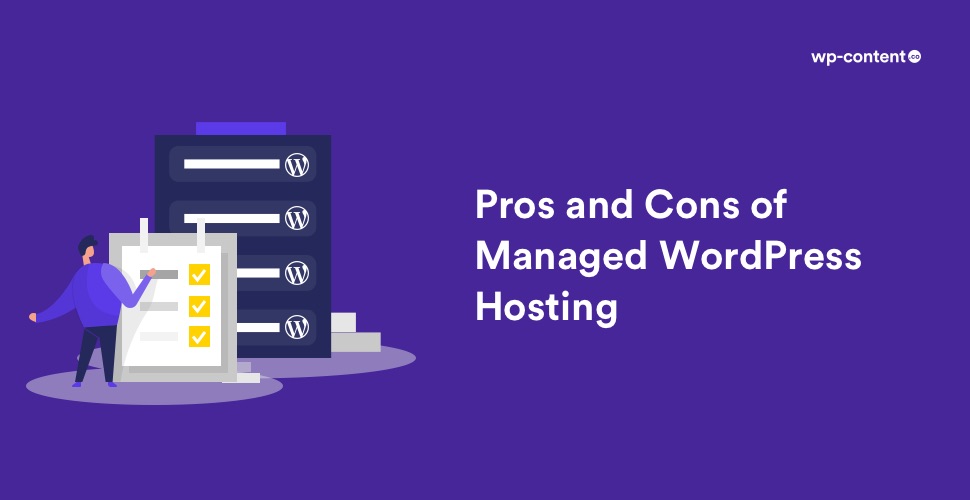In former times, web hosting was only a service where the host contributed the hardware, and the user added the code. But now, things are different. Choosing a web host has become one of the crucial decisions for those who are about to launch their sites. To add to the bustle, there are various hosting plans such as shared, VPS, Managed, etc currently available in the market. However, among the various hosting plans, Managed WordPress hosting has come forth as one of the hottest offerings in the web hosting world.
- What is Managed WordPress Hosting?
- Pros of Managed WordPress Hosting
- 1. High speed and improved performance
- 2. Help from WordPress experts
- 3. Greater Security
- 4. One-Click staging environments
- 5. User-friendly site management
- 6. Easy to integrate SSL Certificates
- 7. Easy access to development tools
- 8. Automatic backups
- 9. Service over and above what normally might be expected
- 10. User can focus more on the content
- Cons of Managed WordPress Hosting
- 1. Pricey Service
- 2. Low flexibility with plugins
- 3. Doesn’t offer email or domains
- 4. WordPress only
- 5. No .htaccess compatibility
- Final thoughts
- Some frequently Asked Questions
What is Managed WordPress Hosting?
Managed WordPress Hosting is the type of hosting service where all technical aspects of running a WordPress is looked after by the host. While most hosting plans leave the larger part of the work to you, managed hosting takes the burden of keeping your site running off your shoulders. This makes it an appealing option for many website users. In other words, you hire the hardware from the host and also pay them for managing your site and other server related issues.
Apart from the regular hosting support, WordPress backing and website maintenance service, Managed hosting provides updates, security maintenance, etc so that you can work on the front-end while a technical person will look after the back-end.
If you are not a tech-savvy and believe that you need assistance to administer your WordPress website, maybe you should take up a Managed WordPress hosting. Apart from the regular hosting support, WordPress backing and website maintenance service, Managed hosting provides updates, security maintenance, etc so that you can work on the front-end while a technical person will look after the back-end.
Also read: What is Managed WordPress Hosting?
There are 2 types of managed hosting – Semi-managed hosting (self-managed hosting) for people who only need a host’s infrastructure and support. Secondly, Fully-managed hosting for people who need both infrastructure and server management support. However, both forms of managed hosting contradict each other in degrees of flexibility, but this does not mean that one particular form exceeds the other in being favorable.
Now, let’s check out the pros and cons of Managed WordPress hosting in this article since it will help to get a lot easier at the time of hosting.
Pros of Managed WordPress Hosting
1. High speed and improved performance
Compared to shared hosting where speed is divided among all users, managed hosting provides better uptime and loads faster. This means that you have the complete right to get the full extent of the speed that is offered. As a result, your website will run evenly and you don’t have to be concerned about negative reviews from the visitors(regarding speed). Besides, fast website speed can decrease page loading time by a few seconds, which is quite a lot in today’s standards.
With a managed WordPress host, you will see considerable advantages because they know how to perfectly optimize your servers based on the kinds of plugins and themes running on your site. Managed hosting providers will also give performance enhancements like a CDN, server locations across the globe, and even immediate-scaling technology (only if you select a provider powered by the Google Cloud Platform ).
2. Help from WordPress experts
You will not only get solutions and support for the usual hosting related issues, but there is a dedicated, experienced team that knows about WordPress from stem to stern and can take care of issues related to the software.
Since a managed hosting provider concentrates on a single CMS, the people behind it will be more experienced and will be able to help with a wide range of WordPress queries. We are not saying that you can’t find strong support with other kinds of hosts, but your benefits are a little better when working with a company that knows WordPress exhaustively. Also, managed hosts favor giving importance to the support they provide to their users, hence you will find options like 24/7 chat, community forums, or ticketing system.
3. Greater Security
The security of your website is essential for you as well as your visitors. As technology progressed, so did the hackers become more refined. Using a managed WordPress host isn’t an impeccable way to protect your site, but you will receive the benefits of inherent security enhancements.
If your site gets hacked, usually a managed WordPress host’s support team can help you to clear it up. Also, they offer nightly backups of your site so that you can smoothly restore, if something goes wrong.
Commonly in shared hosting, though they offer malware scans, they don’t provide any help if your site is hacked or if you face any malware function. The same is the case with VPS hosting and dedicated server. You are the one who is liable if your WordPress site is hacked. Whereas, many managed WordPress hosting providers offer support in such situations and they have systems in order to protect you from malware.
Also read: Top Reasons Why WordPress Sites Get attacked
In fact, the most unique security feature of a managed host is its ability to remove malware. If your site gets hacked, usually a managed WordPress host’s support team can help you to clear it up. Also, they offer nightly backups of your site so that you can smoothly restore, if something goes wrong.
4. One-Click staging environments
You can’t allow your website to stop functioning even for the blink of an eye. So you should always test new alterations, plugins, PHP versions, and updates on a staging environment, not on your production site. Now you might be wondering what is a staging area. It’s a replica of your website in a development environment, making it a better place to harmfully experiment before finalizing the changes to the live site.
In most web-hosting providers, testing involves a complicated and lengthy process of copying your site locally, testing, and then finding out how to move the changes back. Whereas most of the managed WordPress hosting providers include one-click staging environments especially to make testing a cakewalk.
5. User-friendly site management
In the case of managed hosting, everything will be great and coordinated in a commonplace. You don’t have to jump between providers or battle with different site setups. It can act as a single hub if you have multiple websites in a single dashboard.
Managed web hosts not only provide a clean interface to avail your sites but will also watch out updates on plugins, themes, and WordPress core so that your site is always on the newest WordPress version. This can free you from hours of time if you are managing multiple sites. They also offer additional developer-friendly features that you might not get with a shared host. This includes features such as SSH access, HeidiSQL, Git, etc.
6. Easy to integrate SSL Certificates
A website needs to install the SSL Certificate onto its web server to start a secure session with the browsers. Once a secure connection is formed, all web traffic between the web server and the web browser will be secure. And managed WordPress hosts have made it unbelievably easy to add an SSL certificate to your site.
Generally, the process to install an SSL certificate involves a lot of back-and-forth communication between your hosting provider and the certificate provider. With a managed WordPress host, this procedure takes only a few clicks. Thus, managed hosting has played an important role in making SSL certificates easy to install and accessible to all site owners. Even if you want an advanced SSL certificate, a managed hosting provider can help you to get that setup.
7. Easy access to development tools
Although it varies by host, a managed WordPress hosting provider makes common developer tools smoothly accessible to its users right from the beginning. Some use cPanel, while others use their own customized dashboard to make the experience even more captivating and approachable.
If you want to see your site’s slow error logs or need to manually flush the cache, managed hosting does provide the tools for all of these. With such tools, you can perform many functions like export the logs, access SFTP, manage the database, and so on. Additionally, they also provide staging sites as we mentioned earlier. When you integrate all these features together, it makes for an active development workflow regardless of how many sites or clients you are dealing with.
8. Automatic backups
Can you think of running your website for a couple of months or year and then, without any warning, your website falls for some reason. In such cases, the only option left is to start again from scratch if you don’t have any backups. A standard managed WordPress hosting provider will always have daily automatic backups for no extra charge. Backups save the present version of your website and store it for emergencies so that you can restore it in a matter of seconds even if your site crashes. All thanks to the managed hosting providers who backup your website automatically.
With shared hosts also backups are included, but most of them don’t offer regular backups. In the case of VPS hosting, you have to set up your own backup system as well as VPS snapshots which cost you extra money.
9. Service over and above what normally might be expected
Along with fast and safe servers that are required for any high-performing website, managed WordPress hosts also provide other things they can do to enhance your business. This includes workflow tools, partnership features, and even educational content. That is, a managed host is far more than just a service provider, the ideal ones can even be considered as an assistant for your business. They can work together on sites with your team, clients, or one-time contributors, forward demo sites to clients to analyze before going live, and much more.
Also read: Best Managed WordPress Hosting Providers
The peculiar features of each managed WordPress host will differ, but choosing the one designed to support your ideal work-plan can make a huge effect on the result.
10. User can focus more on the content
On the whole, the biggest advantage of using managed WordPress hosting is that you get more time to concentrate on the contents of your website, thus helping you to produce more quality content. Opting for an unmanaged plan can end up spending hours and days taking care of maintenance, optimization, backups, security, etc rather than working on your craft. Above all, the additional tools provided by managed hosts will make your business more powerful and help you conspire more efficiently with your team and clients.
Cons of Managed WordPress Hosting
So, with all of these great features and advantages we have discussed so far, could there be any faults? Well, definitely, there are always a few.
1. Pricey Service
This is a major drawback of managed hosting. The price tag for managed hosting is higher than the cost of shared hosting. In shared hosting, you can acquire services for around $10/month, whereas managed hosting will cost you $20-$30/month for the basic plan. Also, you will have to pay extra if you want faster speed, storage space, and other features.
It’s great if you can afford these services because when compared to the benefits, the price is feasible. But, generally, these services are quite expensive for beginners who have just launched their website and haven’t started to receive any profit yet. In such cases, it is better to go for shared hosting solutions in the beginning. However, if you’re on a tight budget, saving money early on and switching hosts when you can easily afford to do so is a justifiable trick.
2. Low flexibility with plugins
Users love to use plugins in their sites because they add additional functionality to your website. But it is a saddening truth that many managed WordPress hosts boycott certain plugins. Some plugins are open source or third-party software, hence managed hosting providers can block access to them.
In order to give more importance to the security of your site, anything considered as a threat of any kind will be blocked by the host.
This is basically due to security and performance reasons. In order to give more importance to the security of your site, anything considered as a threat of any kind will be blocked by the host. This may result in restricting certain cache plugins or important plugins that some clients need.
3. Doesn’t offer email or domains
Just like the server, the domain name and email are also important for a professional site. Usually, most managed hosting providers don’t provide these features. Hence, you will have to associate with another company for those.
This is especially vital if you want an affordable web hosting server that can host a domain and its emails. But it’s not essential if you are already hosting your emails with a decent 3rd-party service like G-Suite, Zoho, etc. However, this drawback speaks to the fact that managed WordPress hosts are purely focused on WordPress solutions. While they could easily offer these services, they’d instead focus on creating the best-managed hosting platform for your site rather than spreading their company resources thin.
4. WordPress only
Because the server planning is particularly for WordPress, often you are limited to run only WordPress based sites. So there is no way you can access any other site on a managed host other than WordPress. i.e, You won’t be able to work on other systems such as Joomla, Magento, or Drupal on the same server.
5. No .htaccess compatibility
.htaccess files provide a way to make configuration changes on a per-directory basis. Since almost all managed hosts use NGINX, they don’t offer htaccess. This can be a problem if you want htaccess to do certain functions or for certain plugins. You can definitely do redirects and other stuff with a plugin in order to solve this issue, but that creates extra PHP-processing for each page load which weakens the speed of your site.
Final thoughts
In totality, managed WordPress hosting offers a ‘no trouble’ solution for anyone using WordPress site, especially if you are running a business site. They offer many advantages with few cons, and will indeed help you save time and avoid the stress of physically setting up servers.
So, assuming that you are running only WordPress, you should definitely go for managed WordPress hosting rather than shared, VPS, or dedicated server(only if you have the capital). It will give you contentment in terms of additional reliability and security. If you have finalized that Managed hosting is the thing for you, go on to read our next article to know the best managed WordPress hosting providers.
Some Frequently Asked Questions
What is Managed WordPress hosting?
In simple words, it is handing over the technical aspects of running a WordPress site to an expert to manage. Managed WordPress Hosting is specifically designed and optimized for WordPress websites enabling servers to handle high traffic and solve issues like slow speed and downtime and better the security.
Should I buy Managed WordPress hosting?
Depends. If your site has large traffic and you have the necessary budget, go for it. Your website will be in safe hands. The arrangement will help you focus more on creating content or developing business rather than spending time on the technical side. But if you are just a beginner with a low volume website, it is better to stick to shared hosting with less cost.
Is Managed WordPress hosting worth it?
It is definitely worth your money for sites with high traffic and doubly so if you are not very familiar with the technical side of things. You are just getting highly specialized care from the experts in the field for your website.


